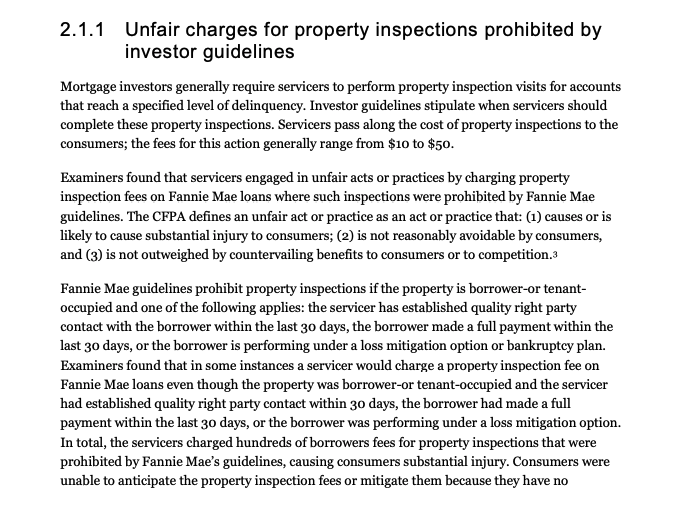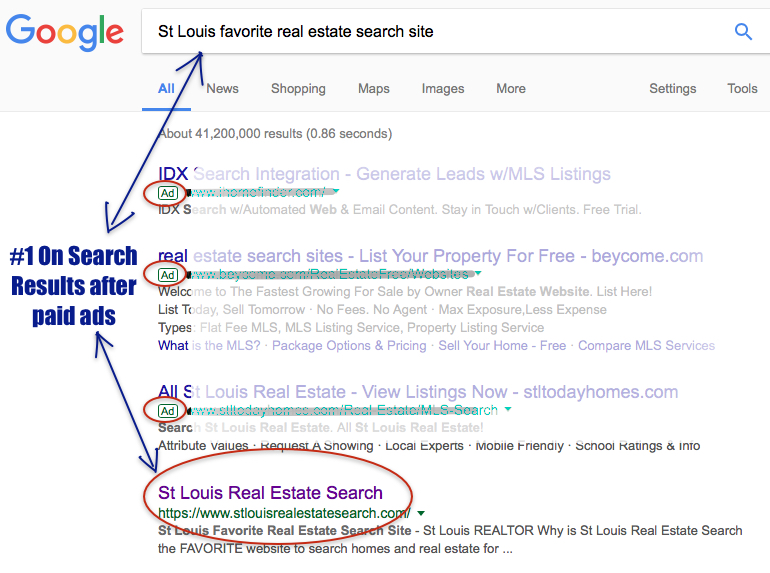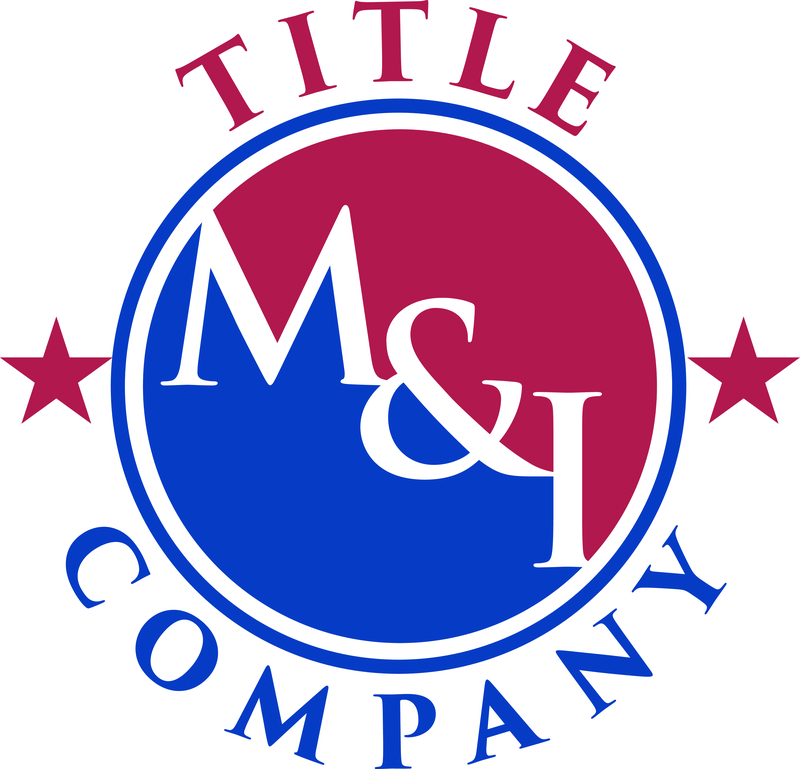Moreover, the report exposes servicers for levying unauthorized late fees, violating both consumer trust and regulatory requirements. These overcharges, which occurred due to flawed administrative processes or oversight, are especially egregious as they can unfairly increase the financial burden on homeowners. The CFPB’s commitment to scrutinizing such practices is a reminder of the need for vigilance among consumers. The report’s findings underscore the importance of homeowners staying informed and proactive in managing their mortgage accounts to avoid falling victim to these predatory practices. For a deeper understanding and additional details, consider reviewing the complete report below .
Today, the Consumer Financial Protection Bureau (CFPB) released details of a Consent Order they reached with Wells Fargo Bank, N.A. in which Wells Fargo is ordered to pay “more than $2 billion in redress to consumers and a $1.7 billion civil penalty for legal violations across several of its largest product lines.” According to a press release issued by the CFPB, Wells Fargo’s “..illegal conduct led to billions of dollars in financial harm to its customers and, for thousands of customers, the loss of their vehicles and homes.” Rohit Chopra, the Director of the Consumer Financial Protection Bureau, stated “Wells Fargo’s rinse-repeat cycle of violating the law has harmed millions of American families”.
The CFPB order requires Wells Fargo to:
- Provide more than $2 billion in redress to consumers: Wells Fargo will be required to pay redress totaling more than $2 billion to harmed customers. These payments represent refunds of wrongful fees and other charges and compensation for a variety of harms such as frozen bank accounts, illegally repossessed vehicles, and wrongfully foreclosed homes. Specifically, Wells Fargo will have to pay:
- More than $1.3 billion in consumer redress for affected auto lending accounts.
- More than $500 million in consumer redress for affected deposit accounts, including $205 million for illegal surprise overdraft fees.
- Nearly $200 million in consumer redress for affected mortgage servicing accounts.
- Stop charging surprise overdraft fees: Wells Fargo may not charge overdraft fees for deposit accounts when the consumer had available funds at the time of a purchase or other debit transaction, but then subsequently had a negative balance once the transaction settled. Surprise overdraft fees have been a recurring issue for consumers who can neither reasonably anticipate nor take steps to avoid them.
- Ensure auto loan borrowers receive refunds for certain add-on fees: Wells Fargo must ensure that the unused portion of GAP contracts, a type of debt cancellation contract that covers the remaining amount of the borrower’s auto loan in the case of a major accident or theft, is refunded to the borrower when a loan is paid off or otherwise terminates early.
- Pay $1.7 billion in penalties: Wells Fargo will pay a $1.7 billion penalty to the CFPB, which will be deposited into the CFPB’s victims relief fund.
To get more information on the CFPB victims relief fund, click here.
Wells Fargo employees who are aware of other illegal activity are encouraged to send information about what they know to whistleblower@cfpb.gov.
The Consumer Financial Protection Bureau (CFPB) earlier this week proposed rule changes that would help prevent “avoidable foreclosures” that will come about when the current foreclosure ban expires June 30th. According to the CFPB, nearly 3 million homeowners are delinquent on their mortgages as a result of the COVID-19 pandemic as well as the economic issues that have come about as a result.
The CFPB’s proposed rule changes include:
- Require a pre-foreclosure review period that would generally prohibit loan servicers from starting foreclosure until after December 31, 2021 on loans secured by a borrower’s principal residence.
- Permit loan servicers to offer “certain streamlined loan modification options to borrowers with COVID-19-related hardships.”
The CFPB is going to accept comments on their proposed rules until May 11, 2011 and then afterward will decide how to proceed.
[xyz-ips snippet=”Homes-For-Sale”]
About the CFPB (from their website)
The Consumer Financial Protection Bureau (CFPB) is a 21st century agency that helps consumer finance markets work by making rules more effective, by consistently and fairly enforcing those rules, and by empowering consumers to take more control over their economic lives. For more information, visit www.consumerfinance.gov.
According to a report just released by the Consumer Financial Protection Bureau (CFPB), titled “Housing insecurity and the COVID-19 pandemic“, there are over 2 million homeowners that have fallen behind at least three months on their mortgage payments. This represents a 250% increase from pre-Covid-19 levels and is now at a level we haven’t seen since the height of the Great Recession in 2010.
Homeowners with an FHA mortgage delinquency rates double rate for all loans:
As the chart below shows, homeowners with an FHA mortgage hit a serious mortgage delinquency rate of 10.8% during the 3rd quarter of 2020, with the rate for all mortgages was just under half that at 5.2%.
Serious Mortgage Delinquency Rate By Loan Type- Q1 2005 – Q3 2020
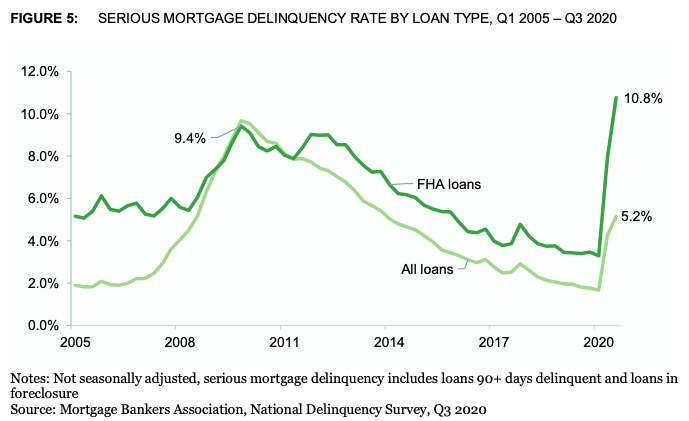
[xyz-ips snippet=”Homes-For-Sale”]
Yesterday, I shared information about forbearance options available to borrowers with an FHA loan that has been impacted by the COVID-19 pandemic. Today, the Consumer Finance Protection Bureau released a very informative video titled “CARES Act Mortgage Forbearance: What You Need to Know” which is below. This video contains a great explanation of what forbearance is, how it works and how to request it on your mortgage.
[xyz-ips snippet=”Homes-For-Sale”]
There is little doubt that lower-income individuals and, subsequently, lower-income neighborhoods, were impacted more negatively by the housing market bubble burst in 2008 than other areas. This resulted in extremely high mortgage delinquency rates, high foreclosure rates, and declining home values. Afterward, citing “loose” lending standards, sub-prime mortgages, etc, the mortgage market tightened the reins on mortgage lending making it more difficult for everyone to get a loan, but particularly, those folks in the lower income brackets.
As time has passed, home loan requirements have eased and it is now easier to obtain a home loan. Some of the requirements that have eased are minimum credit scores, down-payment requirements as well as rules affecting seller paid closing costs, gifts, etc, which has, in particular, helped lower and moderate-income home buyers. The Consumer Financial Protection Bureau (CFPB), the government “watch-dog” of all things financial, tracks and reports data related to home mortgages which reveal that, in fact, home mortgage lending has increased to the highest levels in over a decade in low and moderate-income areas. The CFPB charts below reveal:
- Home loan volume in low-income areas topped $3.8 Billion in November 2016, the highest level since the CFPB began tracking this data in January 2009. The CFPB forecast, predicts that, once the data is in, a record $4 Billion in home loans will be reported for August 2017.
- Home loan volume in moderate-income areas hit $21.7 Billion in October 2016, also the highest level since the CFPB began tracking this data in January 2009. The CFPB forecast, predicts that, once the data is in, a record of $23+ Billion in home loans will be reported for July 2017.
- The middle-income areas have fared well also with home-loan volume hitting a record $76.8 Billion in October 2016. Unlike the low and moderate income area forecasts, the CFPB is forecasting a slight cooling in the middle-income areas with home loan volume dropping to $73.5 Billion for June 2017 and then slightly lower in July once the data is in.
- High-income areas are trailing the other areas in terms of home loan volume having peaked at $116 Billion over 4-years ago, in January 2013. The CFPB is predicting lending data will show $90.5 Billion in home loans in high-income areas for June 2017.
Low-Income Areas – Home Mortgage Volume
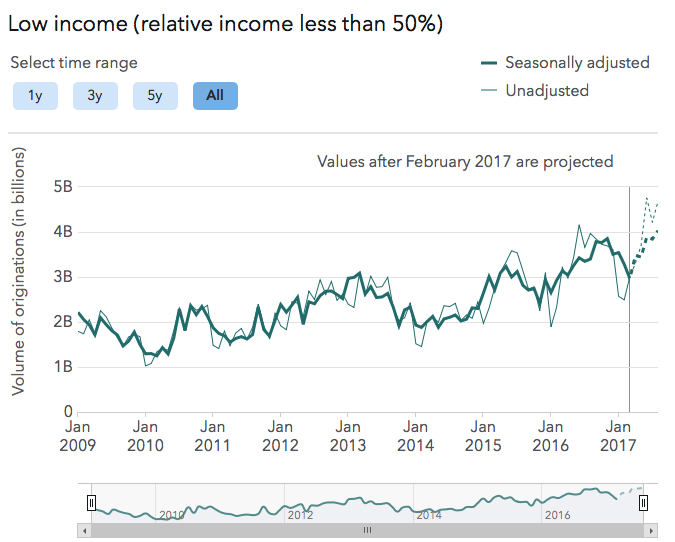
Moderate-Income Areas – Home Mortgage Volume
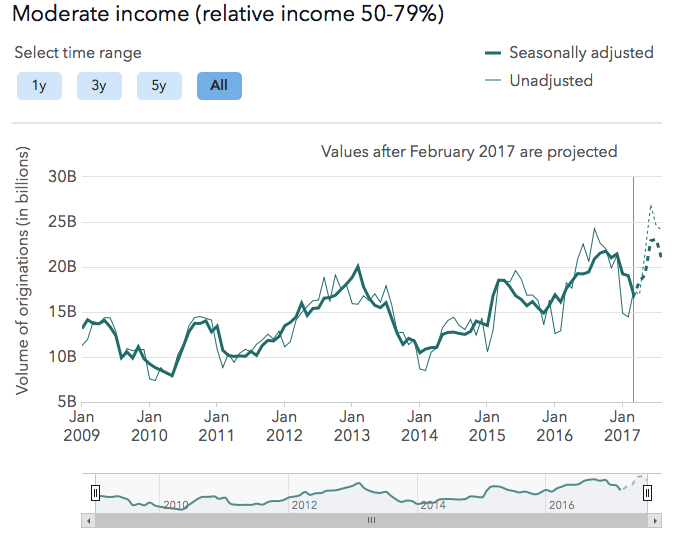
Middle-Income Areas – Home Mortgage Volume
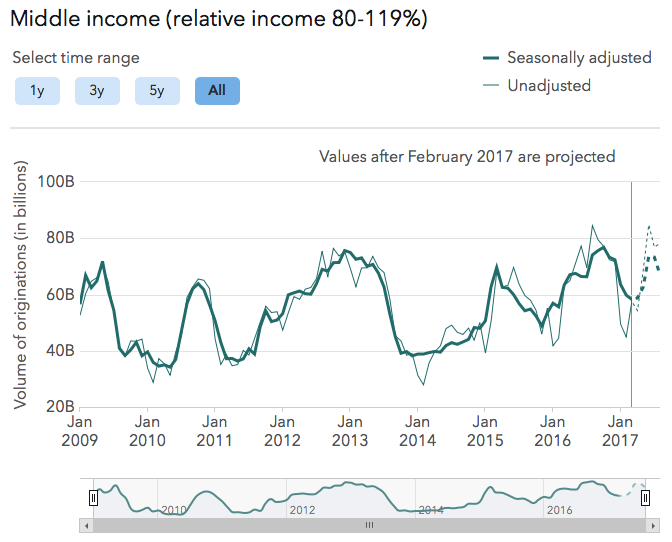
High-Income Areas – Home Mortgage Volume
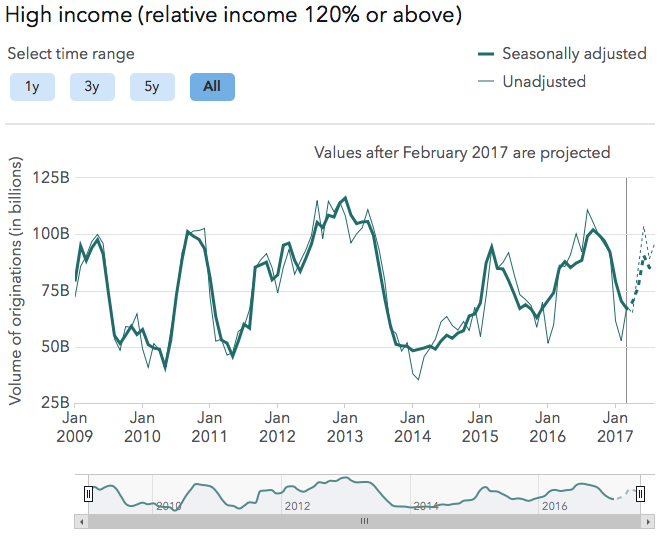
Home buyers for sale! Buy one get one free!
Ok, it’s not quite like that but, if you are a home buyer, odds are you have been bought and sold whether you know it or not! Does this sound surprising to you? I’m guessing it probably does as I don’t think most home buyers realize that, just like the homes they are shopping for, there is a market for home buyers (and sellers, of course) as well. I’m talking about “real estate leads”.
How home buyers are bought and sold…
Before I go further, or, especially if you are a real estate agent reading this, before you start hating on me thinking I’m bashing the idea of leads, I should explain that I have no issue with “leads”. Most every real estate agent I know is always looking for leads or that next opportunity to do business with someone. That is normal. In fact, especially for new, or newer real estate agents, that have not yet established a large referral base, leads are critical to their survival in this business. To go one step further and in the interest of full disclosure, my company, MORE, REALTORS®, is known to be one of the best companies in the St Louis area for generating leads or opportunities for our agents.
Search St Louis Homes For Sale HERE
So, back to how buyers are bought and sold and where my rub comes in. You’ve probably heard of Zillow® and even though St Louis’ favorite real estate search site is our local site, St Louis Real Estate Search (don’t take my word for it, Google it), many, many potential home buyers go to sites like Zillow®, as well as many other large national sites, to search for homes for sale. What a lot of people don’t realize, or never give a thought to is those types of websites are not operated by real estate companies but instead are operated by companies which depend on, among other things, the sale of buyer leads to produce revenue.
I’m not bashing Zillow® here, or anyone else, just simply pointing out the difference between a website such as that one and a local one, such as StLouisRealEstateSearch.com that is operated by local real estate professionals.
How does Zillow® sell the buyers that use their site? Although there may be other ways, what seems to be the most popular way is their Premier Agent® agent program whereby agents pay to be featured next to listings for a particular zip code or many zip codes. What’s wrong with this? Nothing, from the standpoint of Zillow® or the agent buying the leads. From the consumer standpoint though, I’m a strong advocate for informed consumers and, as such, think home buyers should realize that when an agent calls in response to their inquiry on Zillow® that the only real “vetting” for the agent that got the lead was, for the most part, they are paying for leads in that zip code. I have to say again, I’m not criticizing those agents or saying they are bad, in fact, many of them are very good. However, I’m suggesting that you, as a home buyer, be informed and understand how and why they are the one calling you.
So how is this different from the way our company handles leads, or other local real estate companies? Well, while I can’t speak for all companies, I can share how we do it at MORE…For starters, as I mentioned before, our site, StLouisRealEstateSearch.com, is owned and operated by a St Louis real estate company, MORE, REALTORS. At MORE, only agents of good character, that conduct themselves in an honest and ethical manner and are true professionals in every sense are invited to join our firm. Next, we don’t sell our home buyer leads to any agent that pays the price. Instead, when a home buyer makes an inquiry on StLouisRealEstateSearch.com, we match them up with one of our agents that is knowledgeable and experienced in the area, property type, etc that the home buyer is interested in and have that agent follow up. This way we can ensure that a home buyer on our site is going to get the information they want from a local, real estate professional who obtained the lead by being qualified to properly serve the needs of the home buyer.
A final word, and where I do have a problem with Zillow® leads…
I would be remiss if I ended this article without sharing the fact that it has become very common for mortgage lenders, to pay for Zillow® leads for an agent. The issue here is, the loan officer paying for the leads, naturally, expects the agent to refer any buyers that come off the leads back to them for their mortgage. While on the surface this may not seem like a problem, real estate transactions are governed, in part, by the Real Estate Settlement Procedures Act (RESPA) which prohibits kickbacks. In other words, a loan officer can’t pay for leads for an agent and expect the agent to refer the lead back to them for their loan without being in possible violation of RESPA. You can reach more about this in an article I did previously about Zillow coming under fire by the CFPB over this issue here.
I don’t believe the loan officers paying for Zillow® leads for agents are bad. Many of them are very good. I just think it is good for consumers to know how it works, so if you make an inquiry on Zillow, just realize how and why the agent that called you got your info. Then, later, if that agent makes a lender recommendation to you, realize that the lender he or she recommended may have been selected by them based upon that lender “paying for you” rather than simply based upon merit or qualifications of the loan officer. Granted, the lender chosen by the agent to have pay for their leads may very well be the lender that the agent likes doing business with because of their skill and qualifications, but under RESPA the type of arrangement I described appears to be problematic.
My advice…
To home buyers:
- Use a great real estate search site, such as StLouisRealEstateSearch.com, that is backed by local, real estate professionals ready, and qualified, to properly serve you.
- Whether an agent contacts you from our site, Zillow®, or any other site, do your homework on the agent and have the agent share their qualifications and experience with you before deciding whether or not to have that agent represent you.
- When you get a lender recommendation from your agent ask if the agent has any sort of financial relationship with that lender for starters, then check out the lender just like you did the agent. By the way, if there is any sort of financial or business relationship between the agent and lender, that should be disclosed to you without asking.
To real estate agents:
- Before you allow a lender, title company or another party to your real estate transactions to pay for leads for you, or provide services or gifts in exchange for business, get up to speed on RESPA.
- Seek out a company like MORE, REALTORS, which produces enough leads, as well as has the tools, resources and coaching for agents to produce their own leads, thereby eliminating the need to enter into agreements with lenders that may put them at risk.
To loan officers:
- Don’t buy into the “everyone’s doing it so it must be ok” mentality. Pay close attention to the news coming out from Inman and other credible sources about the Zillow investigation by the CFPB as well as reports by the CFPB of fines being levied against loan officers and agents.
- If your company is participating in buying leads for your agents, and particularly if they are telling you it’s ok to do, have them write the check to Zillow® instead of having you do it and then reimbursing you as part of your “expense reimbursement”.
- Find ways to support agents and build your agent network that will not conflict with RESPA. Contact me and I’ll share some ideas.
(Zillow® and Premier Agent® are registered trademarks of Zillow® – REALTOR® is a registered trademark of the National Association of REALTORS®)
The housing bubble that led to the housing bubble burst in 2008 started a decline in the value of homes, including those in St Louis, for the following 3 to 4 years. This resulted in a much larger number of homeowners facing financial struggles including late payments, foreclosures, short sales, bankruptcy and the like, than was the historic norm. As a result, while maybe not a new concept but certainly one that had been more obscure in the past, credit repair, became a lucrative and growing business as consumers sought to repair the damage done and position themselves to buy a home.
In St Louis, there are many companies offering credit repair services, with many making some pretty enticing sounding claims with regard to removal of negative items from your credit, improving your credit score in a short time period and so on. While there are reputable companies out there doing a good job for St Louis homebuyers looking to improve their credit no doubt, there are also some that are probably not doing much more for the consumer than they could easily do on their own or, worse yet, perhaps very little at all for the fee paid.
How do you find a good credit repair company in St Louis?
Search St Louis Homes For Sale HERE
See ALL Homes That Will Be Open In St Louis This Weekend
Get Home Prices and Sale Charts For ANY Area- STLMarketCharts.com
Get Home Prices and Sale Tables and Data For ANY Area- STLMarketReports.com Continue reading “What To Look Out For In Credit Repair Companies“
Zillow, the behemoth real estate search site, revealed in it’s Form 10-Q filed with the Securities and Exchange Commission earlier this month for first quarter 2017, that the Consumer Finance Protection Bureau (CFPB) is investigating some practices by Zillow. According to the filing, what is under review is their co-marketing program in which the CFPB is alleging that Zillow violated parts of both RESPA as well as the Consumer Financial Protection Act. The complete Form 10-Q can be viewed here. On page 40 (outlined in red by me) is the section where Zillow makes this disclosure, and I have pasted that section of the report below as well (the emphasis and color have been done by me).
Excerpt from Zillow’s 10-Q –
“In April 2017, we received a Civil Investigative Demand from the Consumer Financial Protection Bureau (“CFPB”) requesting information related to our March 2017 response to the CFPB’s February 2017 Notice and Opportunity to Respond and Advise (“NORA”) letter. The NORA letter notified us that the CFPB’s Office of Enforcement is considering whether to recommend that the CFPB take legal action against us, alleging that we violated Section 8 of the Real Estate Settlement Procedures Act (“RESPA”) and Section 1036 of the Consumer Financial Protection Act. The purpose of a NORA letter is to provide a party being investigated an opportunity to present its position to the CFPB before an enforcement action may be recommended or commenced. This notice stems from an inquiry that commenced in 2015 when we received and responded to an initial Civil Investigative Demand from the CFPB containing a broad request for information. We believe our response to the NORA letter addresses the CFPB’s concerns related to our co-marketing program under which a lender pays us to appear in advertising alongside a real estate agent. We are continuing to cooperate with the CFPB in connection with their most recent request for information. We continue to believe that our acts and practices are lawful and that our co-marketing program allows lenders and agents to comply with RESPA. Should the CFPB commence an action against us, it may seek restitution, civil monetary penalties, injunctive relief or other corrective action. We cannot provide assurance that the CFPB will not ultimately commence a legal action against us in this matter, nor are we able to predict the likely outcome of the investigation into this matter. We have not recorded an accrual related to this matter as of March 31, 2017 or December 31, 2016, as we do not believe a loss is probable. There is a reasonable possibility that a loss may be incurred; however, the possible loss or range of loss is not estimable.”
Search St Louis Homes For Sale HERE
See ALL Homes That Will Be Open In St Louis This Weekend
Find The Value Of Your Home In Under A Minute!
Continue reading “Zillow Under Investigation By CFPB Over Co-Marketing Program With Real Estate Agents“
In case you are concerned that the real estate industry is not subject to enough regulation, do not let your heart be troubled as new regulations imposed by the Dodd–Frank Wall Street Reform and Consumer Protection Act, which was signed into law back in 2010, affecting home mortgages go into effect October 3, 2015. There has been much talk in the industry about the changes, which are fairly wide-sweeping including changes in the timing of, and type of required disclosures to the borrower as well as a brand new combination loan disclosure form and closing statement. Below, is an overview of some highlights of the changes that I think will most affect St Louis home buyers and sellers as well as links to several additional resources as well.
The New TRID…
Presently, a home buyer, at closing, receives a Truth In Lending Disclosure as well as a HUD-1 closing statement. The former provides the details of the loan including interest rate, APR, costs associated with the loan as well as other details to comply with the Truth in Lending Act (TILA) CFPB Guide (TILA) and the latter provides a summary of the home purchase transaction such as purchase price, credits or charges to the buyer as well as other details required by the Real Estate Settlement Procedures Act (RESPA).
Beginning October 3, 2015, the two forms above will be combined into one, consumer-friendly, TRID (TILA-RESPA Integrated Disclosure) form. The new TRID will present all the important financial details of the loan and home purchase into one form which will be much easier for the typical consumer to benefit form than the current forms.
Search St Louis Homes For Sale HERE
See ALL Homes That Will Be Open In St Louis This Weekend
5 Key Strategies To Assure A Quick Home Sale At The Maximum Price
Continue reading “How Will Implementation of Dodd-Frank Affect The Real Estate Market?“
 January 10, 2014 new QM rules (qualified mortgage) will go into effect and will most likely negatively impact the ability of some home buyers to obtain a mortgage. In terms of how many borrowers the new rules will affect, it is hard to say. There have been several analysis’ done of the percentage of home loans originated in 2012 would not have met the QM rules and the estimates vary from 12 percent to more than half. Personally, I think the lower estimates are probably closer to accurate, but it is still a significant number…potentially somewhere around 1 of every 9 home buyers may not be able to obtain a mortgage that, absent the new QM rules, would have been able to.
January 10, 2014 new QM rules (qualified mortgage) will go into effect and will most likely negatively impact the ability of some home buyers to obtain a mortgage. In terms of how many borrowers the new rules will affect, it is hard to say. There have been several analysis’ done of the percentage of home loans originated in 2012 would not have met the QM rules and the estimates vary from 12 percent to more than half. Personally, I think the lower estimates are probably closer to accurate, but it is still a significant number…potentially somewhere around 1 of every 9 home buyers may not be able to obtain a mortgage that, absent the new QM rules, would have been able to.
UPDATE 12/06/13 – Read/download the CFPB Compliance Guide for new QM rule
Watch CFPB Video on QM Rule Here
What are the QM Rules and who do they affect? Continue reading “New QM Rules Going To Put Home Loans Out of Reach For Some Buyers Come January“
Free Credit Scores are Not Part of the Free Annual Credit Report Consumers Currently Receive
Consumers currently have the right to request their free credit report once a year, but a credit report does not include free credit scores. These two items are often confused to be the same, which they are not.
You generally must pay to see your credit score. It’s a three-digit grade that predicts how risky you are to a lender.
Earlier this month, bills were introduced in the House and Senate to allow all consumers free access to credit scores once a year. The Free Access to Credit Scores Act was authored by U.S. Sen. Bernie Sanders of Vermont and U.S. Rep. Steve Cohen of Tennessee.
 Continue reading “Free Credit Scores As A Result of New Act“
Continue reading “Free Credit Scores As A Result of New Act“
 Forty-one percent of the respondents to the Fannie Mae National Housing Survey for January 2013 said they expect home prices to rise in the next 12 months which is down slightly from 43 percent last month but up significantly from a year ago when only 30 percent felt home prices would rise. Ten percent of the respondents feel home prices will drop in the coming year and 45 percent said they feel prices will remain the same.
Forty-one percent of the respondents to the Fannie Mae National Housing Survey for January 2013 said they expect home prices to rise in the next 12 months which is down slightly from 43 percent last month but up significantly from a year ago when only 30 percent felt home prices would rise. Ten percent of the respondents feel home prices will drop in the coming year and 45 percent said they feel prices will remain the same.
The Justice Department, the Department of Housing and Urban Development (HUD) and 49 state attorneys general announced today the filing of their landmark $25 billion agreement with the nation’s five largest mortgage servicers to address mortgage loan servicing and foreclosure abuses. Continue reading “Bank of America, J.P. MOrgan Chase, Wells Fargo, Citigroup and Ally Financial reach $25 Billion Agreement with Fed & State Government over Foreclosure Abuses“

A report released this morning by CoreLogic shows that the current residential “shadow” inventory as of July 2011 declined slightly from 1.7 million units in April to 1.6 million units, and was down from 1.9 million units a year ago. This current shadow inventory represents a 5 month supply. CoreLogic includes in it’s shadow inventory numbers properties that are either 90+ days delinquent on mortgages, in some stage of foreclosure, or an REO but not presently for sale in an MLS. Continue reading “Shadow Inventory Continues to Decline; Good news for the housing market“

 This week, in response to the House Appropriations committee voting to slash funding for the newly formed Consumer Financial Protection Bureau (CFPB) and to subject the new agency to a “politically-charged” funding process, Mike Calhoun, President of the Center for Responsible Lending, made the following comment: “the House Appropriations Committee yesterday voted for a return to policies that allowed predatory financial products to plunder our economy. Clearly some lawmakers have forgotten the lesson of today’s financial crisis, which continues at great cost to taxpayers, shareholders, retirees and, of course, tens of millions of families who have needlessly lost their homes or seen them plummet in value.” Continue reading “Consumer organization blasts House Appropriations Committee on recent vote; fear return to policies that allowed predatory lending“
This week, in response to the House Appropriations committee voting to slash funding for the newly formed Consumer Financial Protection Bureau (CFPB) and to subject the new agency to a “politically-charged” funding process, Mike Calhoun, President of the Center for Responsible Lending, made the following comment: “the House Appropriations Committee yesterday voted for a return to policies that allowed predatory financial products to plunder our economy. Clearly some lawmakers have forgotten the lesson of today’s financial crisis, which continues at great cost to taxpayers, shareholders, retirees and, of course, tens of millions of families who have needlessly lost their homes or seen them plummet in value.” Continue reading “Consumer organization blasts House Appropriations Committee on recent vote; fear return to policies that allowed predatory lending“
 The newly formed Consumer Financial Protection Bureau (CFPB), one of the newest agencies under the Federal Government, created “to make markets for consumer financial products and services work for Americans”. Hmm, sounds good, but as usual, I was skeptical. However, thus far, I’m pretty impressed with the CFPB’s approach to changing mortgage disclosure statements in an effort to make it easier for consumers to understand the terms of the home mortgage they have been offered as well as to shop “apples to apples” for the best home mortgage. Continue reading “New disclosure form aims to make home mortgage terms easier to understand“
The newly formed Consumer Financial Protection Bureau (CFPB), one of the newest agencies under the Federal Government, created “to make markets for consumer financial products and services work for Americans”. Hmm, sounds good, but as usual, I was skeptical. However, thus far, I’m pretty impressed with the CFPB’s approach to changing mortgage disclosure statements in an effort to make it easier for consumers to understand the terms of the home mortgage they have been offered as well as to shop “apples to apples” for the best home mortgage. Continue reading “New disclosure form aims to make home mortgage terms easier to understand“

Frank Gregoire
My world was much different in the late 1980’s. Although I was in the real estate business and the real estate appraisal profession for a decade, political activity did not interest me. Here at Gregoire & Gregoire, we had already been using a networked mini-computer for appraisal reporting since 1983, but I did not have an email account or address. I did not surf the web. Our clients were savings and loan associations, FHA lenders, loan discount companies (purchasers of privately originated first and second mortgages), real estate brokers, and several lawyers. All our research was completed through examination of paper and microfiche records. We went through Polaroid SX-70 film packs by the case and always kept a spare camera or two in the back seat or trunk of the car. Life was good. The appraisal profession, at least here in the Sunshine State, was one coveted by many. Continue reading “H.R. 4173; The Dodd-Frank Wall Street Reform and what it means to appraisers“
Department of Justice Press Release |
| NAME | ADDRESS | YEAR OF BIRTH |
| EDWARD G. MCCUSKER | New Hope, PA | 1964 |
| JEFFREY A. BENNETT | Springfield, PA | 1966 |
| STEPHEN G. DOHERTY | Doylestown, PA | 1966 |
| JOHN A. BARIANA | Mullica Hill, NJ | 1972 |
| JACQUELINE D. MCCUSKER | New Hope, PA | 1964 |
Defendants Edward and Jacqueline McCusker, Jeffrey Bennett, and John Bariana face maximum sentences of 240 years’ imprisonment, $3.25 million in fines, three years supervised release, and a $1,200 special assessment. Defendant Stephen Doherty faces a maximum sentence of 385 years’ imprisonment, $4 million in fines, three years supervised release, and a $1,500 special assessment. These are the maximum sentences that may be imposed if the defendants are convicted; the advisory United States Sentencing Guidelines call for a sentence less than the statutory maximum.
The indictment seeks forfeiture of the proceeds of the fraudulent scheme, which is alleged to be approximately $14.6 million.
This case was investigated by the Federal Bureau of Investigation and the Pennsylvania Department of Banking. It is being prosecuted by Assistant United States Attorney Nancy Rue.
By: Dennis Norman
Over the past two days I published the first part and second part of my E-View TMwith Wendy Cromer, Vice-President of Marketing for Security Title Insurance Agency, LLC about title insurance, the new laws affecting it and things consumers should know.
Today were going to do the final part of our E-View TM with Wendy:
Dennis-Wendy, title insurance seems to be one of those things that is a mystery to most homeowners. Can you please explain what title insurance is and give us an idea of how it works? Continue reading “Title Insurance 101 from a St. Louis Title Professional – Final post in the series“
Recently the The Office of the Comptroller of the Currency issued a Consumer Advisory. The Advisory contains consumer tips for avoiding mortgage modification scams and foreclosure rescue scams.
The advisory states; “Scams that promise to “rescue” you from foreclosure are popping up at an alarming rate nationwide, and you need to protect yourself and your home. If you’re falling behind on your mortgage, others may know it too – including con artists and scam artists. They know that people in this situations are vulnerable and often desperate.”
The OCC suggests that before you do business with someone offering to negotiate a loan modification for you or to stop or delay foreclosure for a fee that you carefully check his or her credentials, reputations, and experience. Watch out for warning signs of a scam, and always maintain personal contact with your lender and mortgage servicer. Continue reading “Avoid mortgage modification and foreclosure rescue scams“
